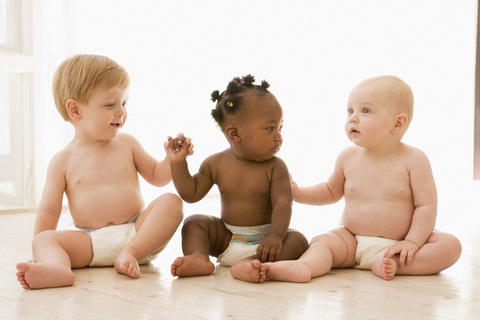Oh Baby: Giving Birth 10 Times May Reduce Mom's Cancer Risk

Women who give birth to 10 or more children may have a reduced risk of cancer, a new study from Finland suggests.
Researchers examined cancer risk in nearly 5,000 Finish women who gave birth at least 10 times before 2010.
Over a three-decade period, there were 656 cases of cancer in these women, about 200 fewer cases than would be expected based on cancer rates in the general Finnish population, the study found. [Blossoming Body: 8 Odd Changes That Happen During Pregnancy]
In fact, the rate of new cancer cases was 24 percent lower among women who delivered 10 or more babies compared to those in the general population, the researchers said.
This overall reduction in cancer risk came mainly from decreased rates of breast cancer and gynecological cancers, including ovarian and endometrial cancer (cancer of the uterus lining). For these cancers, the rate of new cancer cases was about 50 percent lower in women with 10 or more deliveries, compared to the general population.
The researchers aren't sure whether the findings apply to women who have just one, two or three children, but plan to conduct another study to find out, said study researcher Dr. Juha Tapanainen, of the Department of Obstetrics and Gynecology at Helsinki University Central Hospital.
Pregnancy and cancer risk
Sign up for the Live Science daily newsletter now
Get the world’s most fascinating discoveries delivered straight to your inbox.
In the study, women who had 10 or more babies were about five years younger when they gave birth to their first child, compared to average Finnish women. It's known that becoming pregnant at a young age helps protect against breast cancer, Tapanainen said.
Women who give birth before age 20 have about half the risk of breast cancer as those who give birth for the first time after age 30, according to the National Institutes of Health. Some researchers hypothesize that this is because pregnancy speeds up the process of breast cell maturation, and that mature cells are more resistant to cancer, Tapanainen said. So, women who have children at younger ages develop mature, cancer-resistant breast cells sooner.
Previous studies have also found that giving birth to at least five children reduces the risk of breast cancer. This may be because pregnancy halts the menstrual cycle, so the breast cells of women who have many pregnancies are exposed to less estrogen, according to the American Cancer Society. (Exposure to estrogen is thought to increase the risk of breast cancer.)
The halting of ovulation, and the hormone changes that period in life causes, may also play a role in the reduced risk of ovarian and endometrial cancers.
Many women in the new study who had 10 or more children were members of the Laestadian movement, which is part of the Lutheran Church in Finland, the researchers said. Women in this group are similar to average Finnish women in terms of their lifestyle, but their religion prohibits the use of contraceptives.
Studies on the effect of hormonal contraceptives on cancer risk have been inconclusive, but some studies suggest that the contraceptives reduce the risk of ovarian and endometrial cancer. Thus, it's possible that if Laestadian women in the study also took contraceptives, and still had multiple pregnancies, it would even further reduce their risk of these cancers, Tapanainen said.
Risks of many pregnancies
The study further linked having 10 babies with a reduced risk of basal cell skin cancer, and an increased risk of thyroid cancer. But the researchers don't know the reason for this link.
Researchers noted that women who are able to have 10 or more children are likely healthier than women in the general population. But this factor alone is unlikely to explain the link between having 10 babies and the reduced risk of these cancers, Tapanainen said.
In general, the findings suggest that having more children doesn't result in an increased occurrence of cancer, Tapanainen said. The protective effect is seen after five births, and is even greater with 10 births, Tapanainen said.
Despite the reduced risk of cancer, giving birth to five or more children does come with its own dangers, increasing the risk of pregnancy complications, such as premature birth and hemorrhaging after delivery.
Follow Rachael Rettner @RachaelRettner. Follow Live Science @livescience, Facebook & Google+. Original article on Live Science.

Rachael is a Live Science contributor, and was a former channel editor and senior writer for Live Science between 2010 and 2022. She has a master's degree in journalism from New York University's Science, Health and Environmental Reporting Program. She also holds a B.S. in molecular biology and an M.S. in biology from the University of California, San Diego. Her work has appeared in Scienceline, The Washington Post and Scientific American.









